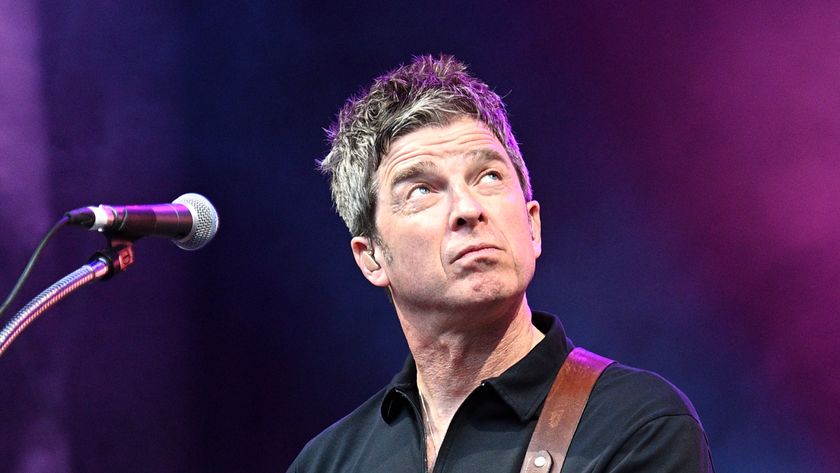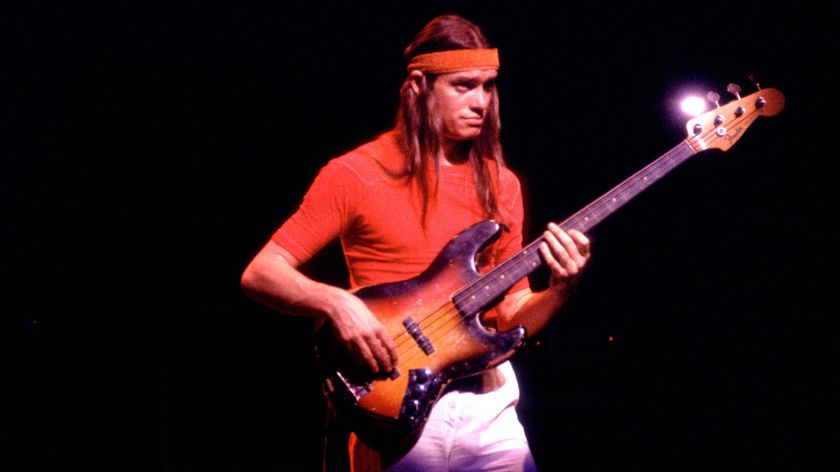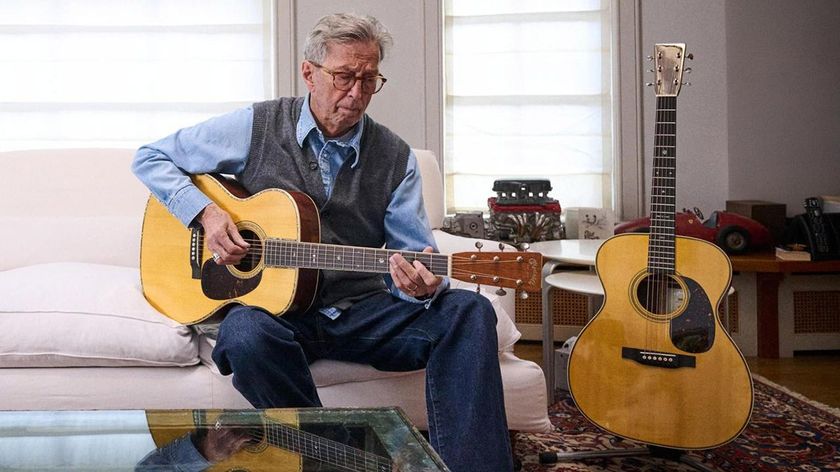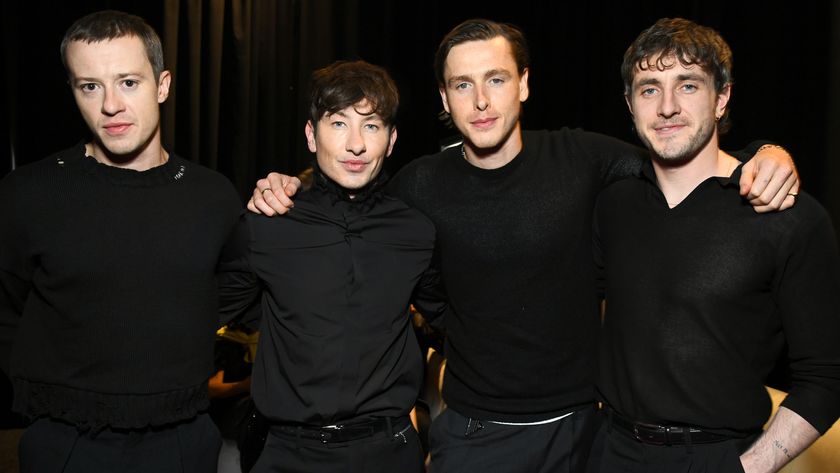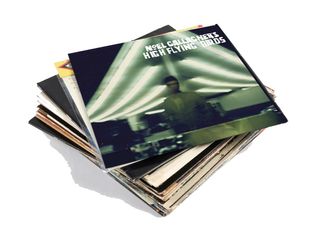
Noel Gallagher's High Flying Birds: full album review track-by-track
Sometimes it helps to bide one's time, as Noel Gallagher has surely done in the two years since he walked away from Oasis, effectively shuttering the biggest British band of the last 30 years. While brother Liam rushed out and grabbed the first ray of new rising sun with Beady Eye, offering up a fair-to-decent version of Oasis-sounding songs, Noel took the long-view approach, realizing that a great album has to be nurtured, coddled and brought up right.
Of course, he has some experience in this area; indeed, a couple of the numbers on his solo debut, Noel Gallagher's High Flying Birds - the album's name is the same as his band - have been percolating for a decade now, with demos and soundcheck recordings leaking famously on the internet.
Some might say (oh!) that Noel has always held all of the cards: He was the principle songwriter for Oasis, penning the lion's share of the catalogue and all of the hits. Not only that, but his singing voice - a rich, throaty delivery, alternating between a tenor and a baritone - was the more expressive, and widely underused, of the two Gallagher brothers.
All right, so let's cut to the chase: The 10 songs on Noel Gallagher's High Flying Birds rank as the best set of material the singer-songwriter and guitarist has assembled since (What's The Story) Morning Glory? As it is with the best of composers, the emotional buttons - desperate, angry, joyful, melancholy and everything else - are right there in plain sight, but the light and dark between the hues are swimming about, too, and they're up for grabs.
Working in both London and Los Angeles between 2010 and 2011, with frequent collaborator Dave Sardy serving as co-producer, Gallagher utilized the talents of now bandmates Jeremy Stacey (drums), Lenny Castro (percussion) and Mike Rowe (keyboards). It's a close-knit bunch, and the manner in which they jump through so many moments of epiphany, sometimes in the space of one song, is astonishing.
Noel Gallagher's High Flying Birds - an intensifier of feelings, and a strong contender for Record Of The Year - will be released on 17 October (8 November in the US). On the following pages, we'll take a look at this wondrous album track-by-track.
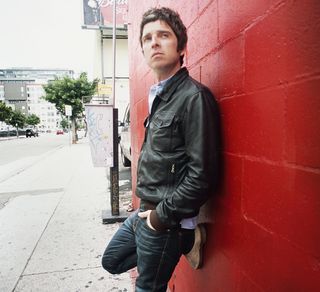
Everybody's On The Run
After a few seconds of studio prep sounds (talking, clanging, a cough), a snare kicks off this rousing opener that immediately recalls the epic grandeur of George Harrison's All Things Must Pass.
Soaring background vocals and heart-tugging strings blend for a massive dramatic sweep. Throughout, Noel sings like a desperate, impassioned soul - "Hang in there love/ you gotta hold on/ 'cause everybody's on the run," he pleads in the chorus - weaving melodies that swirl around one's head but stick like glue.
The arrangement is grand but never artificial. The bridge has a classic rock feel and a symphonic intensity. Acoustic guitars overwhelm and lead into the last resounding chorus, during which Noel extends and hammers home his lyrical meaning. A smashing lead-off track, but can the rest hold up?
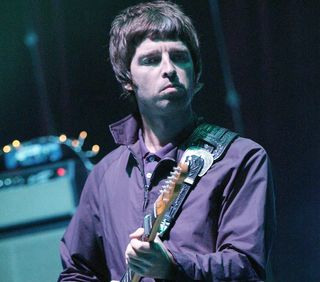
Dream On
You wouldn't think that Noel Gallagher would give a damn about any trumpet-playin' band, but he uses horns on this track, and elsewhere on the album, to stunning effect. And it most certainly is rock 'n' roll!
A jaunty, pounding beat underpins briskly strummed, robust-sounding acoustics (and a bit of Link Wray riffiness), making Dream On feel like something of a more aggressive She's Electric. But Noel, using a more mature vocal, brings a new kind of charm - and vulnerability, an unmasked need - to the proceedings.
The choruses are doozies, complete with "la-la-la" sing-alongs. Brass creeps in, dominating the end section, bringing a taste of New Orleans as the tune bops along to a flourish. Expect many iPhones waving in the air as Noel plays this baby live.
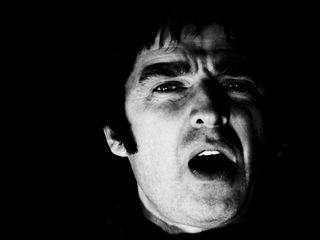
If I Had A Gun
Talk about anticipation. Ever since leaked soundcheck demos of this song appeared on the internet, much interest has attended its inevitable studio rendering. We can happily report that the results meet every expectation and then some.
With piano and acoustic guitar guiding him, Noel - moody, delicate and restless - sings, "If I had a gun, I'd shoot a hole into the sun/ and love would burn this city down for you" in this quasi-Wonderwall-like gem.
Haunting background vocals create a stirring leitmotif. If I Had A Gun pops with electric guitars, heading right into the first chorus in which Noel intones, "'Scuse me if I spoke too soon/ my eyes have always followed you around the room/ 'cause you're the only God I will ever need/ I'm holding on and waiting or you to find me."
That's major-league writing, in what will surely become a modern-rock standard. Noel keeps his delivery in check, never surrendering to showboating, and even as the instruments pile up and peak around him, he stays the course. A hands-down winner, this one.
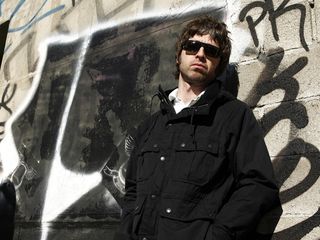
The Death Of You And Me
The first single from High Flying Birds is a whisper, starting with a capoed, 12-string acoustic intro figure that ushers in Noel's sweet falsetto. The overall mood here is laid-back, '70s-era Kinks, but it's honest and sailing, with nothing getting in the way, as a melancholy Noel sings, not ironically, "High time, summer in the city/ kids are looking pretty/ but isn't it a pity in the sunshine."
The beauty in these lines is how Noel personifies the words, making them his own, and in that way, because we know they're special to him, we can relate. Even the way he draws out the word "sunshine," making it a sneery "sunshiiiiine," is a communal expression - whether it's Johnny Rotten or Liam, we get it. He does it with wink, and we're there.
While the track bears an unmistakable resemblance to The Importance Of Being Idle, it gradually takes on its own form, looming larger, with another taste of New Orleans-style brass skillfully moving in.
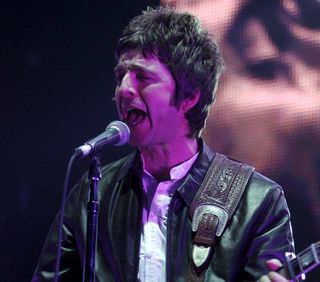
(I Wanna Live In A Dream In My) Record Machine
At first, we hear the sounds of schoolchildren on the playground - innocent, unspolied, complete in their world - and then, amidst an acoustic guitar and and a Phil Spectorish jingle stick, Noel begins singing what very might be his own teenage symphony to God.
Bass and electrics climb aboard, with Noel's double-tracked voice becoming mega. Strings emerge, big and bold, in a chorus that's an absolute grabber - we're talking fists in the air. Whether it's an homage to the Wall Of Sound or not, it caresses the senses in much the same way.
The sonics increase, and before long Noel is at the top of his lungs, open-hearted and open-throated - it's a delirious feeling. After a brief, gentle break, the song breaks away into a grand gallop. Here's one pony that can't be tamed.
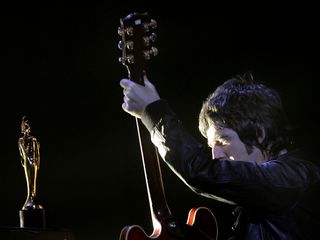
AKA...What A Life!
A pounding four-on-the-floor beat drives this incessant, piano-heavy rocker. Noel, cynical and evil, sings with a world-weariness, "Some say you might find your hero/ some say you might lose your mind."
In the chorus, he twists and raises his voice, elegantly and poetically, making the last word of the title sound like "liiiiiiife." He plays with nuance, finding a center and skirting with the outer edges.
A piercing guitar line links the verse and chorus sections, and right when you least expect it, an honest-to-goodness six-string solo breaks out - and it's a spine-tingler, too. An elongated verse ends the song on an ominous note, but it's one that leaves the listener breathlessly waiting for more.
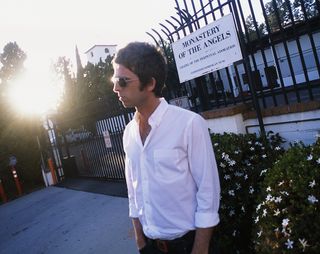
Soldier Boys And Jesus Freaks
It's a pop-sounding cut, and appropriately so, this ode to the Turtles, all stark guitars and a moving bassline during which Noel sings what are perhaps his most pointed political lyrics.
The chorus is a cymbal-heavy crasher, but horns meet Noel and carry the bridge in true '60s fashion. Here's it's a mishmash, a bright mix of Sgt. Pepper meets The Association meets The 5th Dimension with even The Doors a la The Soft Parade thrown in for good measure.
The ride-out is a smasher, ending with a jingle-jangle of tambourine. It puts a smile on one's face, and it's a crafty counterpoint to the weight of the song's message.
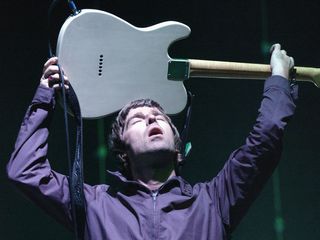
AKA...Broken Arrow
Perhaps the most straightforward song on the album. A sparkling mix of drums and acoustics lead into Noel singing what feels like a love song: "Fallen angel/ a broken arrow/ she comforts me and eases my troubled mind/ she shines a light out into the shadows/ all the world that we will leave behind."
Like all of Noel's best compositions, the hooks and resolves flow naturally, revealing little to no artiface. The dynamics, including his voice, rise and fall effortlessly, as if there's no other possible way to go. Scores of songwriters strive for unbridled spirit, but only a few, and Gallagher is one of them, can tap into, and master, such feelings.
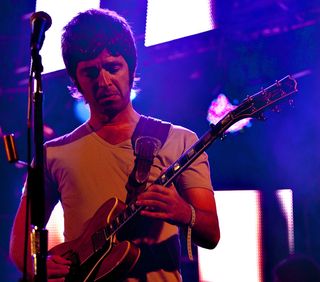
(Stranded On) The Wrong Beach
A thumping garage rocker, glowing with a bass-note pattern over which Noel sings in his most wistful voice. At first, it feels like a bit of a trifle, especially in light of what's come before, but it's affecting nonetheless, working its way under your skin and into your being.
Some artists can do that; they touch us and they matter; they loom large and take on a space of importance that even friends and relatives can't occupy. The sound of their voice triggers emotions and stirs our blood. It's a gift, and it's one Noel possesses, and like the brightest of Hollywood stars, he can rule our passions with just the subtlest of gestures.
Handclaps accentuate the drums, and the tone grows aching as Noel sings, "Drowning, I'm sinking in the quicksand/ stranded on the wrong beach/ come and rescue me."
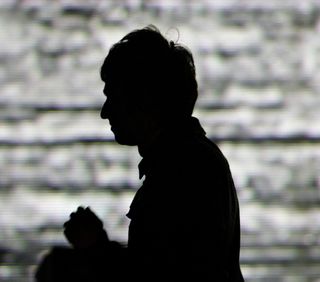
Stop The Clocks
Written sometime in 2001, Noel said of the track a year later that it was about "a dream I had one night. It's wondering about if you were dead, how would you know you were actually dead, how would you know you were actually alive."
Originally intended to be included on 2004's Don't Believe The Truth, Stop The Clocks has achieved something of a mythic status amongst Oasis fans, with studio and live versions leaking onto the internet over the years.
How can you blame anyone for not holding back this five-minute piece of genius? It's difficult. On the other hand, did they hear the memorable organ riff than informs the body of the finished song? Did they know of the explosive power when the number kicks in, not once but twice? The final version that Noel Gallagher has realized makes good on all past promises.
"Stop the clocks and turn the world around/ let your love lay me down," Noel sings in the opening verse, displaying his heart and making his feelings come through his pores. He has a way of sharing with the the listener why he's sweating - it's as if he's trained to do so, but then that would be too easy an explanation.
After a furious build-up, the song rides out on a bonkers lead guitar break. It's a star-turn, sure, and Gallagher might very well end his set milking this rocket for all it's worth, but it works dramatically, and that's all that matters. After the numerous builds and releases that this album provides, going out on anything less than the highest of highs would be a letdown. On High Flying Birds, Noel Gallagher might have reached his Everest.

Joe is a freelance journalist who has, over the past few decades, interviewed hundreds of guitarists for Guitar World, Guitar Player, MusicRadar and Classic Rock. He is also a former editor of Guitar World, contributing writer for Guitar Aficionado and VP of A&R for Island Records. He’s an enthusiastic guitarist, but he’s nowhere near the likes of the people he interviews. Surprisingly, his skills are more suited to the drums. If you need a drummer for your Beatles tribute band, look him up.

"Reggae is more freeform than the blues. But more important, reggae is for everyone": Bob Marley and the Wailers' Catch a Fire, track-by-track

“Part of a beautiful American tradition”: A music theory expert explains the country roots of Beyoncé’s Texas Hold ‘Em, and why it also owes a debt to the blues

"Reggae is more freeform than the blues. But more important, reggae is for everyone": Bob Marley and the Wailers' Catch a Fire, track-by-track

“Part of a beautiful American tradition”: A music theory expert explains the country roots of Beyoncé’s Texas Hold ‘Em, and why it also owes a debt to the blues
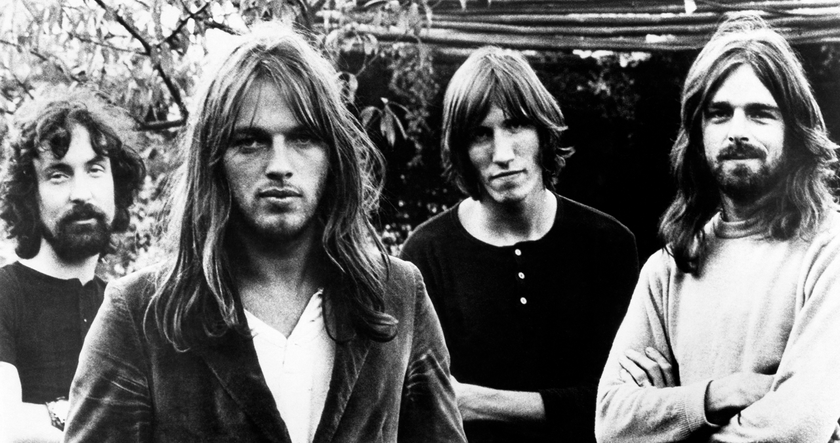


![Chris Hayes [left] wears a purple checked shirt and plays his 1957 Stratocaster in the studio; Michael J. Fox tears it up onstage as Marty McFly in the 1985 blockbuster Back To The Future.](https://cdn.mos.cms.futurecdn.net/nWZUSbFAwA6EqQdruLmXXh-840-80.jpg)
